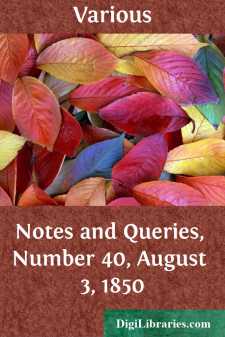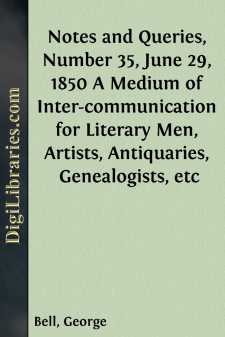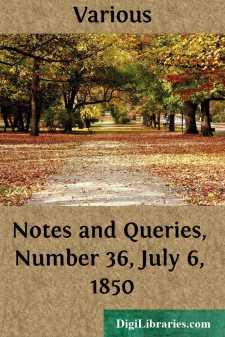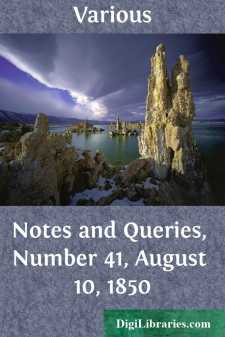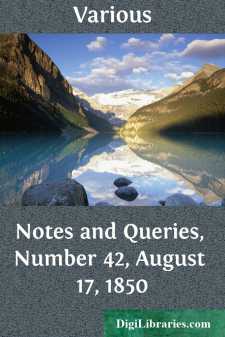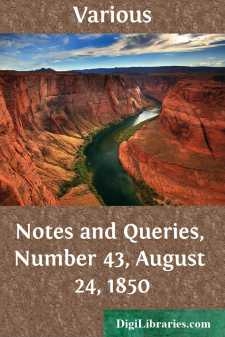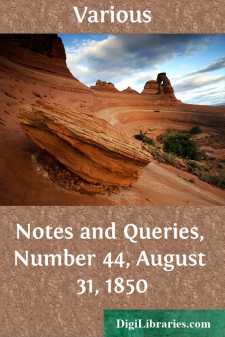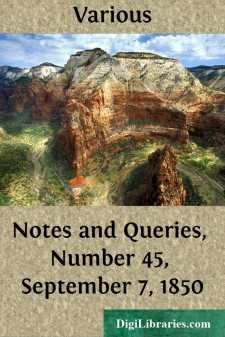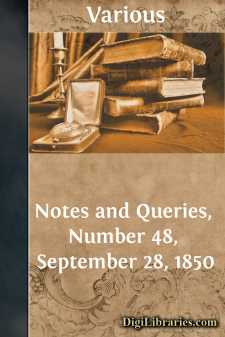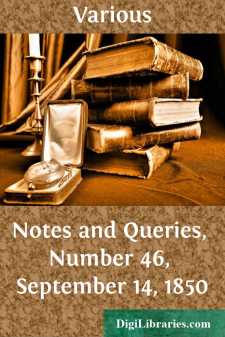Periodicals
- Art 27
- Children's periodicals 59
- Entertainment 5
- Food/Wine 2
- Games/Humor 455
- General 661
- Health 1
- History 53
- House/Home 1
- Regional 62
- Science/Nature 118
- Transportation 10
Periodicals Books
Sort by:
by:
Various
NOTES. TRANSLATIONS OF JUVENAL—WORDSWORTH. Mr. Markland's ascertainment (Vol. i., p. 481.) of the origin of Johnson's "From China to Peru," where, however, I sincerely believe our great moralist intended not so much to borrow the phrase as to profit by its temporary notoriety and popularity, reminds me of a conversation, many years since, with the late William Wordsworth, at which I...
more...
by:
George Bell
GEORGE GORING, EARL OF NORWICH, AND HIS SON GEORGE, LORD GORING. G.'s inquiry (Vol. i., p. 22.) about the two Gorings of the Civil War—a period of our history in which I am much interested—has led me to look into some of the sources of original information for that time, in the hope that I might be enabled to answer his Queries. I regret I cannot yet answer his precise questions, when Lord...
more...
by:
Various
NOTES FURTHER NOTES ON DERIVATION OF THE WORD "NEWS". Without being what the Germans would call a purist, I cannot deem it an object of secondary importance to defend the principles of the law and constitution of the English language. For the adoption of words we have no rule; and we act just as our convenience or necessity dictates: but in their formation we must strictly conform to the laws...
more...
by:
Various
NOTES. SIR WILLIAM GASCOIGNE. Although you and I no doubt unite in the admiration, which all our fellow-countrymen profess, and some of them feel, for our immortal bard, yet I do not think that our zeal as Shakspearians will extend so far as to receive him as an unquestionable authority for the facts introduced into his historical plays. The utmost, I apprehend, that we should admit is, that they...
more...
by:
Various
NOTES ALFRED'S OROSIUS. The two exceedingly valuable elucidations which the geography of King Alfred relating to Germany (intercalated in the royal author's translation of Orosius), has received from your learned contributors MR. R.T. HAMPSON (Vol. i., p. 257.) and MR. S.W. SINGER (Vol. i., p. 313.) induce me to offer some new views on the same subject. From my having passed a long series of...
more...
by:
Various
NOTES NOTES AND QUERIES The history of books and periodicals of a similar character ought to be the object of interest to the readers of this work. The number of works in which answers have been given to proposed questions is not small. Not to mention the Spectator and its imitators, nor the class of almanacs which give riddles and problems, nor mathematical periodicals of a more extensive...
more...
by:
Various
NOTES GRAVESEND BOATS. While so much has been said of coaches, in the early numbers of "Notes and Queries" and elsewhere, very little notice has been taken of another mode of conveyance which has now become very important. I think it may amuse some of your readers to compare a modern Gravesend boat and passage with the account given by Daniel Defoe, in the year 1724: and as it is contained in...
more...
by:
Various
NOTES. FOLK LORE. The First Mole in Cornwall; a Morality from the Stowe of Morwenna, in the Rocky Land.—A lonely life for the dark and silent mole! She glides along her narrow vaults, unconscious of the glad and glorious scenes of earth, and air, and sea! She was born, as it were, in a grave, and in one long living sepulchre she dwells and dies! Is not existence to her a kind of doom? Wherefore is...
more...
by:
Various
NOTES. RIOTS OF LONDON. Seventy years having passed away since the riots of London, there cannot be many living who remember them, and still fewer who were personally in contact with the tumultuous throng. Under such circumstances, I venture to offer for introduction into your useful and entertaining miscellany some incidents connected with that event in which I was either personally an actor or...
more...
by:
Various
NOTES. THE MEANING OF "DRINK UP EISELL" IN HAMLET. Few passages have been more discussed than this wild challenge of Hamlet to Laertes at the grave of Ophelia: "Ham. I lov'd Ophelia! forty thousand brothers Could not, with all their quantity of love, Make up my sum. What wilt thou do for her? —Zounds! show me what thou'lt do? Woo't weep? Woo't fight? Woo't fast?...
more...


